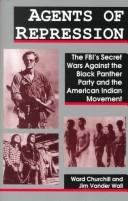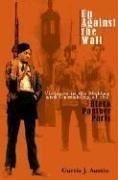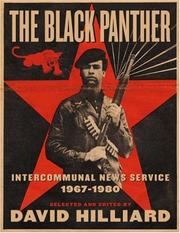
ISBN: 0896082938 Year: 1988 Publisher: Boston South End press
Abstract | Keywords | Export | Availability | Bookmark
 Loading...
Loading...Choose an application
- Reference Manager
- EndNote
- RefWorks (Direct export to RefWorks)
United States. --- American Indian Movement. --- Black Panther Party.
Book
ISBN: 9781438475448 1438475446 9781438475431 1438475438 Year: 2019 Publisher: Albany : State University of New York Press,
Abstract | Keywords | Export | Availability | Bookmark
 Loading...
Loading...Choose an application
- Reference Manager
- EndNote
- RefWorks (Direct export to RefWorks)
Black power --- African American political activists --- African Americans --- History --- Politics and government --- Black Panther Party --- United States --- Race relations --- Afro-American political activists --- Political activists, African American --- Political activists --- Black Panthers --- BPP (Black Panther Party) --- B.P.P. (Black Panther Party) --- Black Panther Party for Self-Defense

ISBN: 1299401945 1610754441 9781610754446 1557288275 9781557288271 1557288275 9781557288271 9781557288752 1557288755 9781299401945 Year: 2006 Publisher: Fayetteville University of Arkansas Press
Abstract | Keywords | Export | Availability | Bookmark
 Loading...
Loading...Choose an application
- Reference Manager
- EndNote
- RefWorks (Direct export to RefWorks)
African Americans --- Black power --- Political violence --- Violence --- Political crimes and offenses --- Terrorism --- Politics and government --- History --- Black Panther Party --- Black Panthers --- BPP (Black Panther Party) --- B.P.P. (Black Panther Party) --- Black Panther Party for Self-Defense --- History. --- United States --- Race relations --- Biography --- 20th century
Book
ISBN: 0813058600 0813057493 0813066395 9780813057491 9780813065458 0813065453 9780813066394 Year: 2020 Publisher: Gainesville
Abstract | Keywords | Export | Availability | Bookmark
 Loading...
Loading...Choose an application
- Reference Manager
- EndNote
- RefWorks (Direct export to RefWorks)
In the tumultuous year after Martin Luther King Jr.'s assassination, Pete O'Neal founded the Kansas City branch of the Black Panther Party. 'Black Panther in Exile' is his gripping story. One of the most influential members of the movement, he now lives in Africa - unable to return to the United States but refusing to renounce his past.
African American political activists --- African Americans --- Americans --- Civil rights --- History --- O'Neal, Pete. --- Black Panther Party --- History. --- Yankees --- Ethnology --- Afro-American political activists --- Political activists, African American --- Political activists --- Black Panthers --- BPP (Black Panther Party) --- B.P.P. (Black Panther Party) --- Black Panther Party for Self-Defense

ISBN: 9781416532590 Year: 2007 Publisher: New York, N.Y. ATRIA Books
Abstract | Keywords | Export | Availability | Bookmark
 Loading...
Loading...Choose an application
- Reference Manager
- EndNote
- RefWorks (Direct export to RefWorks)
Book
ISBN: 9780816676491 9780816676484 Year: 2011 Publisher: Minneapolis ; London : University of Minnesota Press,
Abstract | Keywords | Export | Availability | Bookmark
 Loading...
Loading...Choose an application
- Reference Manager
- EndNote
- RefWorks (Direct export to RefWorks)
Between its founding in 1966 and its formal end in 1980, the Black Panther Party blazed a distinctive trail in American political culture. The Black Panthers are most often remembered for their revolutionary rhetoric and militant action. Here Alondra Nelson deftly recovers an indispensable but lesser-known aspect of the organization’s broader struggle for social justice: health care. The Black Panther Party’s health activism—its network of free health clinics, its campaign to raise awareness about genetic disease, and its challenges to medical discrimination—was an expression of its founding political philosophy and also a recognition that poor blacks were both underserved by mainstream medicine and overexposed to its harms.Drawing on extensive historical research as well as interviews with former members of the Black Panther Party, Nelson argues that the Party’s focus on health care was both practical and ideological. Building on a long tradition of medical self-sufficiency among African Americans, the Panthers’ People’s Free Medical Clinics administered basic preventive care, tested for lead poisoning and hypertension, and helped with housing, employment, and social services. In 1971, the party launched a campaign to address sickle-cell anemia. In addition to establishing screening programs and educational outreach efforts, it exposed the racial biases of the medical system that had largely ignored sickle-cell anemia, a disease that predominantly affected people of African descent.The Black Panther Party’s understanding of health as a basic human right and its engagement with the social implications of genetics anticipated current debates about the politics of health and race. That legacy—and that struggle—continues today in the commitment of health activists and the fight for universal health care.
Minorities --- Discrimination in medical care --- Race discrimination --- Medical care --- Black Panther Party.
Book
ISBN: 2348069121 2348069113 Year: 2022 Publisher: Paris : La Découverte,
Abstract | Keywords | Export | Availability | Bookmark
 Loading...
Loading...Choose an application
- Reference Manager
- EndNote
- RefWorks (Direct export to RefWorks)
"C'est l'histoire de Melvin et Jean McNair, deux e´tudiants afro-ame´ricains qui se rencontrent en 1966 en Caroline du Nord. Marie´s, deux enfants, ils auraient pu mener une vie paisible. Mais il y a la guerre du Vietnam, l'assassinat de Martin Luther King, l'e´lan re´volutionnaire des Black Panthers. Melvin est de´serteur. Pour fuir et de´noncer le racisme, Jean et lui de´tournent un avion avec trois complices, le 30 juillet 1972. Destination Alger, capitale d'un pays inde´pendant et d'un tiers monde incandescent. Arre^te´s apre`s avoir e´te´ exfiltre´s vers Paris, qui refuse de les extrader, ils sont emprisonne´s et juge´s lors d'un proce`s me´diatise´ ou` l'on croise James Baldwin et Simone Signoret. Leur peine purge´e, ils refont leur vie a` Caen et deviennent des figures locales engage´es. Le parcours de Jean et Melvin montre de fac¸on exemplaire comment s'entreme^lent concre`tement les questions de race et de classe. De´finis comme Noirs aux E´tats-Unis, le restent-ils a` leur arrive´e en France et a` quelles formes de racialisation sont-ils confronte´s ? A` partir d'archives et d'entretiens ine´dits, cette grande fresque sociohistorique nous plonge, de part et d'autre de l'Atlantique, dans les luttes antiracistes et anti-impe´rialistes des anne´es 1970. En de´centrant le regard, elle offre de nouvelles perspectives sur les sujets bru^lants que sont le racisme anti-Noirs et la radicalite´ politique."--Page 4 of cover.
Civil rights movements --- History --- McNair, Melvin, --- McNair, Jean, --- Black Panther Party
Book
Year: 2010 Publisher: [Washington, D.C.] : [U.S. G.P.O.],
Abstract | Keywords | Export | Availability | Bookmark
 Loading...
Loading...Choose an application
- Reference Manager
- EndNote
- RefWorks (Direct export to RefWorks)
Black Panther Party --- United States. --- Trials, litigation, etc. --- Powers and duties.
Book
Year: 2010 Publisher: Washington, DC : U.S. Commission on Civil Rights,
Abstract | Keywords | Export | Availability | Bookmark
 Loading...
Loading...Choose an application
- Reference Manager
- EndNote
- RefWorks (Direct export to RefWorks)
Intimidation --- Elections --- Corrupt practices --- New Black Panther Party --- Trials, litigation, etc.
Book
ISBN: 0393054837 Year: 1973 Publisher: New York (N.Y.): Norton
Abstract | Keywords | Export | Availability | Bookmark
 Loading...
Loading...Choose an application
- Reference Manager
- EndNote
- RefWorks (Direct export to RefWorks)
African Continental Ancestry Group --- Race Relations --- Erikson, Erik H. --- Newton, Huey P. --- Black Panther Party.

 Search
Search Feedback
Feedback About UniCat
About UniCat  Help
Help News
News